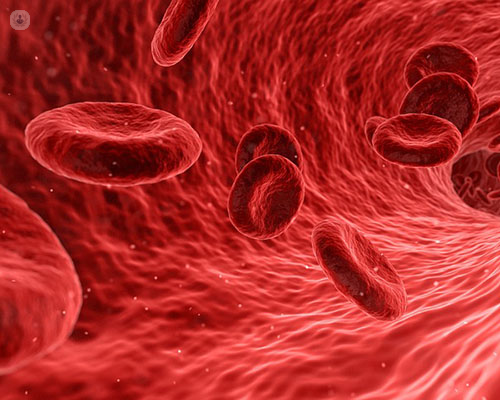


What are bleeding disorders?
Coagulopathies or bleeding disorders are a group of blood coagulation disorders. They can be inherited (such as haemophilia, von Willebrand disease or hereditary platelets conditions) or acquired (caused by a defect in the synthesising process of the plasma constituents of the blood, or by an assimilation of antibodies attacking haemocoagulating factors). Acquired coagulopathies are primarily caused by an unhealthy diet, malabsorption or medications inhibiting the absorption of vitamin K (which helps with blood coagulation).

Prognosis of bleeding disorders:
Some bleeding disorders can cause the blood coagulation process to fail (haemorrhage or haemophilia). On the contrary, others can lead to hypercoagulation (originating thrombosis and embolisms). In both cases these disorders could become potentially life-threatening if not adequately treated.
What are the symptoms of bleeding disorders?
The most common symptoms of a bleeding disorder are:
- Bruising, for no apparent reasons;
- Haemarthrosis (bleeding into the joint spaces);
- Post-partum bleeding;
- Blood effusion in the pleura (haemothorax);
- Heavy periods (menorrhagia);
- Abnormal uterine bleeding (AUB or metrorrhagia);
- Nosebleeds;
- Anal bleeding;
- Traces of blood in the urine;
- Traces of blood in the semen;
- Thrombocytosis;
- Permanent, involuntary and painful penis erection (priapism);
- Bleeding gums;
- Rheumatism;
- Bleeding gums;
- Joint pain and swelling.
How are they diagnosed?
You will have to go through your medical history with your doctor, including your habits (which medications you’re on, if you’re allergic to anything, if you have had blood transfusions before, if you smoke and/or drink). You will also have to do a blood test (with specific testing regarding coagulation factors).
What causes bleeding disorders?
Bleeding disorders occur when there is an absence or deficiency of coagulation factors in your blood. Coagulation factors are proteins that allow the blood to clot. Their absence or deficiency can derive from several factors, including:
- Genetic factors, such as haemophilia or von Willebrand disease, or having a family history of confirmed coagulopathies;
- Acquired factors: these include taking anticoagulants, being on antibiotics for a long time, liver conditions or having disseminated intravascular coagulation (DIC).
How can they bleeding disorders be prevented?
People with a high risk of developing coagulopathies should take some preventive measures, especially in case of excessively rapid clotting (which can lead to thrombosis). Exercising regularly, losing weight and avoiding sitting for too long can help you fight bleeding disorders.
How are bleeding disorders treated?
In the most severe cases, coagulopathies can be treated with blood transfusions. However, the most common treatment is medication.
Which medications can I take?
A haematology specialist may prescribe one or more of the following medications:
- Medications preventing the formation of blood clots;
- Contraceptive pill, to help with the heavy periods;
- Medications making up for the absence or deficiency in coagulation factors.
Which doctor should I talk to?
You should see a haematology specialist, who will prescribe all the necessary tests and treatments.